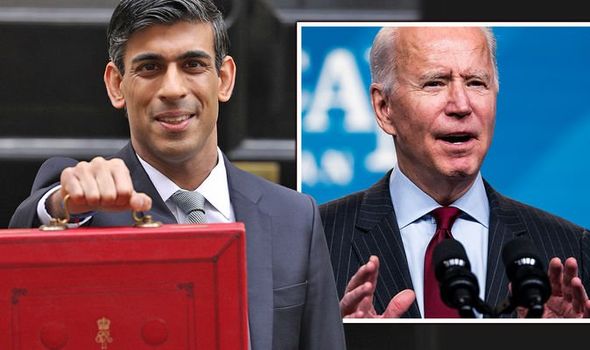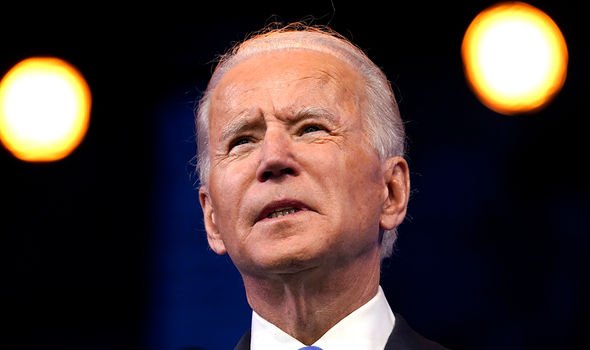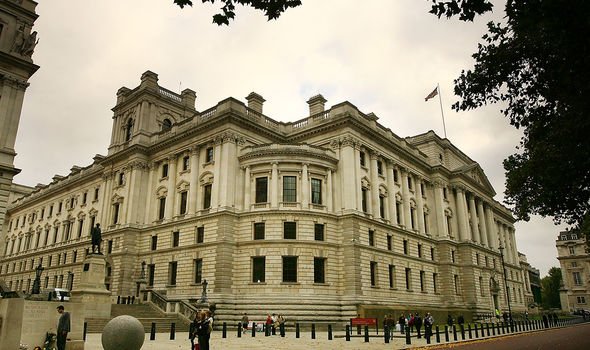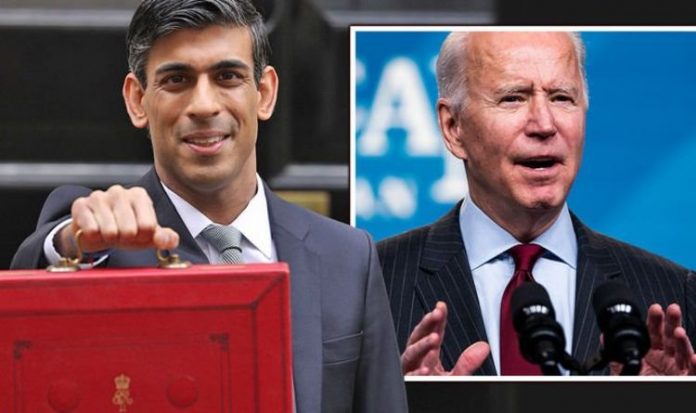Rishi Sunak slammed for Gordon Ramsay ‘PR stunt’ by Labour MP
The Chancellor will deliver the next Budget on Wednesday and the expectations are as high as the stakes. After 10 years campaigning for fiscal prudence after the financial crisis, the Conservatives have suddenly found themselves presiding over the biggest borrowing binge since World War 2. So far, Rishi Sunak’s rhetoric has remained somewhat cautious, indicating that the battle against the deficit of the credit crunch has left its mark on him.
In his spending review in November – before the latest wave of Covid really started spreading – the Chancellor warned this year’s bumper borrowing was only possible “because we came into this crisis with strong public finances”.
He said: “We have a responsibility, once the economy recovers, to return to a sustainable fiscal position.”
And this morning, speaking to Sky News, Mr Sunak said: “I would like to keep taxes low for people… but I want to deliver our promises to the British people that we will be responsible with their money.”
The stamp duty holiday, it seems, is to be extended for at least another three months, planned fuel tax rises will be cancelled, VAT relief for the hospitality sector will be extended and there may even be a cut in alcohol duty in pubs.
However, there is one very large exception to these – almost certainly temporary – tax cuts.
Corporation tax, it seems, is to be increased – the first in a series of steps which will take it from 19 percent today to 25 percent.
Some believe the rate might go straight to 25 percent next week.

Rishi Sunak poised to copy Joe Biden’s plan for tax rises: ‘It never made sense’ (Image: GETTY)

Chancellor of the Exchequer Rishi Sunak (Image: GETTY)
According to Government officials, the Chancellor will use the election of Joe Biden as partial cover for a big Budget increase in corporation tax rates, arguing that the US President is also planning a rise in business taxes.
Treasury officials told the Financial Times Mr Biden — and more recently US Treasury Secretary Janet Yellen — have proposed an increase in corporate tax rates from 21 percent to 28 percent.
Officials working on the Budget say Mr Sunak wants to keep Britain’s business taxes “competitive” with other G7 countries.
The proposed rise in the headline corporate tax rate in the US would give Mr Sunak greater scope to increase the UK rate.
Mr Biden explained his policy on the basis of budgetary prudence and fiscal equity.
British officials say a notional headline rate of 25 percent would still be among the lowest in the G7 group, although such an increase is expected to trigger outrage from some Conservative MPs.
Michael Heseltine, former President of the Board of Trade, told the Financial Times: “The Chancellor faces a large budget deficit and he has to tackle it.
“Of all the options available, increasing corporation tax by relatively small percentages seems to me one of the least unattractive.”
JUST IN: London could ‘make EU’s nightmare come true’

Lord Michael Heseltine (Image: GETTY)

US President Joe Biden (Image: GETTY)
Business leaders have been reportedly relaxed about the prospect of raising corporation tax, with several executives saying this would at least mean they were making a profit and spare those that were still struggling in the pandemic.
One told the publication: “Corporation tax is pretty safe political ground.
“There is not too much outrage. At least with a tax on profit, the point is there is profit to be taxed. It’s not hitting us on the way in.”
But bosses also cautioned that it would depend on how high the tax rises went.
One business leader said: “It would raise the question over our international competitiveness and about attracting inward investment, which the government seems very keen on.”
Malcolm Jame, Head of Accounting, Economics and Finance at Cardiff Metropolitan University, explained why corporation tax “never made sense” in a recent report.
He wrote: “The rationale for cutting the corporate tax rate rested on a set of assumptions that have come to look highly debatable.
“Governments were threatened that if the rate were too high, global companies would relocate to a country with a more favourable tax regime, thereby depriving the first country of both tax revenue and economic activity.
“The evidence that they actually do so is mixed. For example, Accountancy Age reported that only 22 companies left the UK for tax reasons between 2007 and 2011.
DON’T MISS:
Mario Draghi’s push for ‘more European UK’ in City of London [INSIGHT]
Germany strong-armed EU members into forgoing punishment: ‘Shut up!’ [ANALYSIS]
EU used Sturgeon’s independence bid to ‘destabilise’ Brexit Britain [REVEALED]

The Treasury (Image: GETTY)
“At the same time, companies which move their head offices for tax purposes do not necessarily move their underlying economic activity.
“When Starbucks decided to move its European headquarters from Amsterdam to London in 2014, for instance, it obviously wasn’t moving the coffee shops through which it trades.
“It was reported that Starbucks’ move would create only a few jobs in the City of London (albeit well-paid ones), and therefore not much tax revenue.
“This suggests that when companies do move offices to be more economically active elsewhere, ‘talent trumps tax incentives’. More than likely, taxation is of much less importance than factors such as the quality of the labour force and infrastructure.”
In short, Mr Jame noted, the “race to the bottom” on corporation tax was never built on very strong foundations.
He concluded in his piece for The Conversation: “It is no coincidence that the arguments supporting rate reductions have started to lose traction.
“During the good times, people are not too concerned about how the cake is divided up, the argument being ‘let’s just bake a bigger cake’.
“In times of crisis, arguments about fairness and equality tend to become much more important.
“Even for politicians on the right and centre such as Sunak and Biden, the Covid crisis and the ensuing shock to the economy have created much more political leeway to raise rates than previously.
“It will be interesting to see what happens in practice in the coming weeks – and whether other major economies decide to move in the same direction.”







